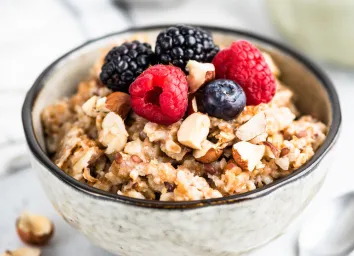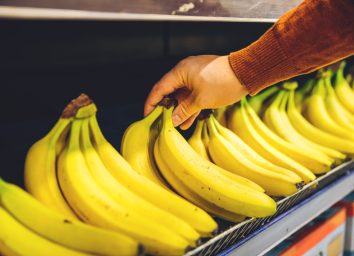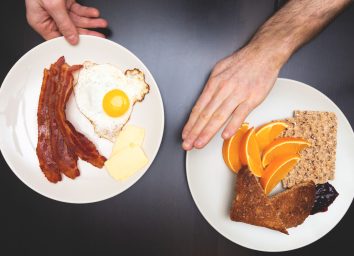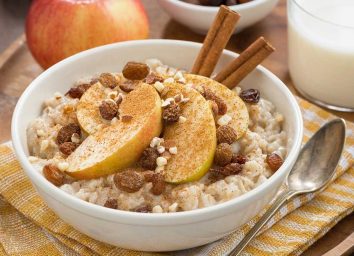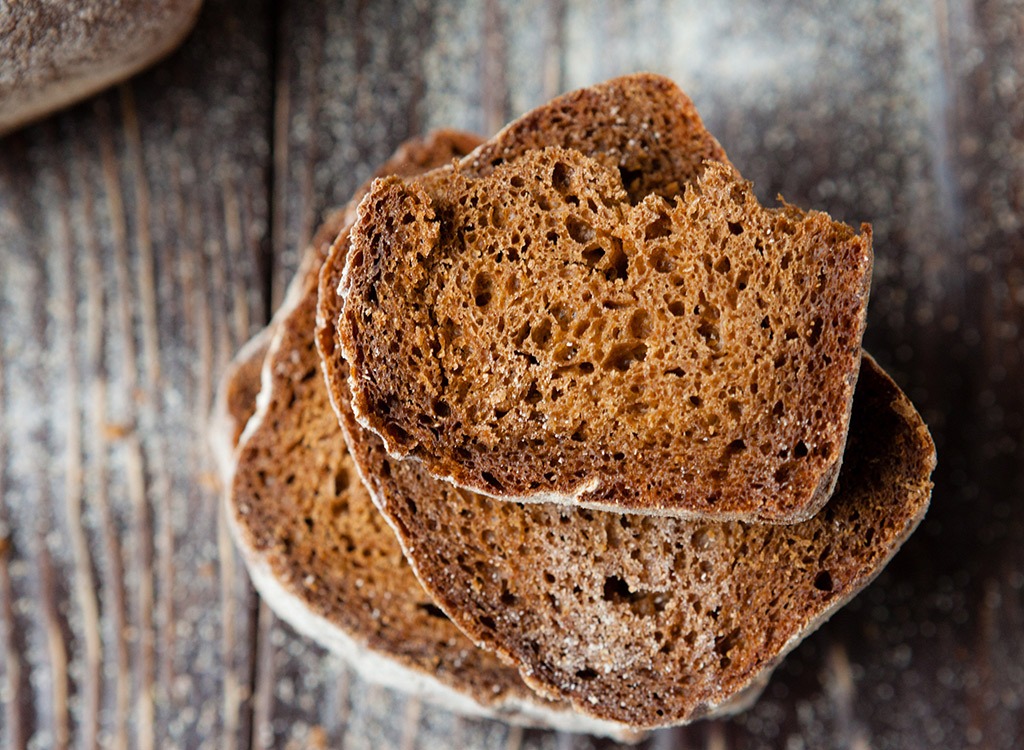
Carbs have become the black sheep of the macronutrient family—for no good reason. Carbohydrates play a crucial role in allowing your body to function well. Healthy carbs can help with weight regulation, body composition, and even reduced risk of type 2 diabetes.
“Fad diets often lead people to fear carbohydrates. But the research continues to show that healthy carbohydrates—from fruits, vegetables, beans, and whole grains—are the healthiest fuel for our bodies,” says Hana Kahleova, MD, PhD, director of clinical research for the Physicians Committee for Responsible Medicine and lead author of a study showing that a diet high in the right carbohydrates reduces body weight, belly fat, and improves insulin function in overweight people.
Dr. Kanhleova says the key nutrient driving the positive results is the fiber in plant foods that adds bulk to the diet without adding extra calories. On the other hand, the carbs that make you fat are refined carbs that are lacking in fiber. These unhealthy carbs—sugary beverages, desserts, baked goods, and processed foods—promote weight gain and increase hunger.
That’s why swapping refined carbs for these healthy carbs will not only prevent you from gaining weight, they may also help you lose it.
So, here’s your grocery list: The best carbs you can eat that won’t make you fat. And for more on the best carbs for your belly, check out What Happens to Your Body When You Drink a Smoothie Every Day.
Amaranth
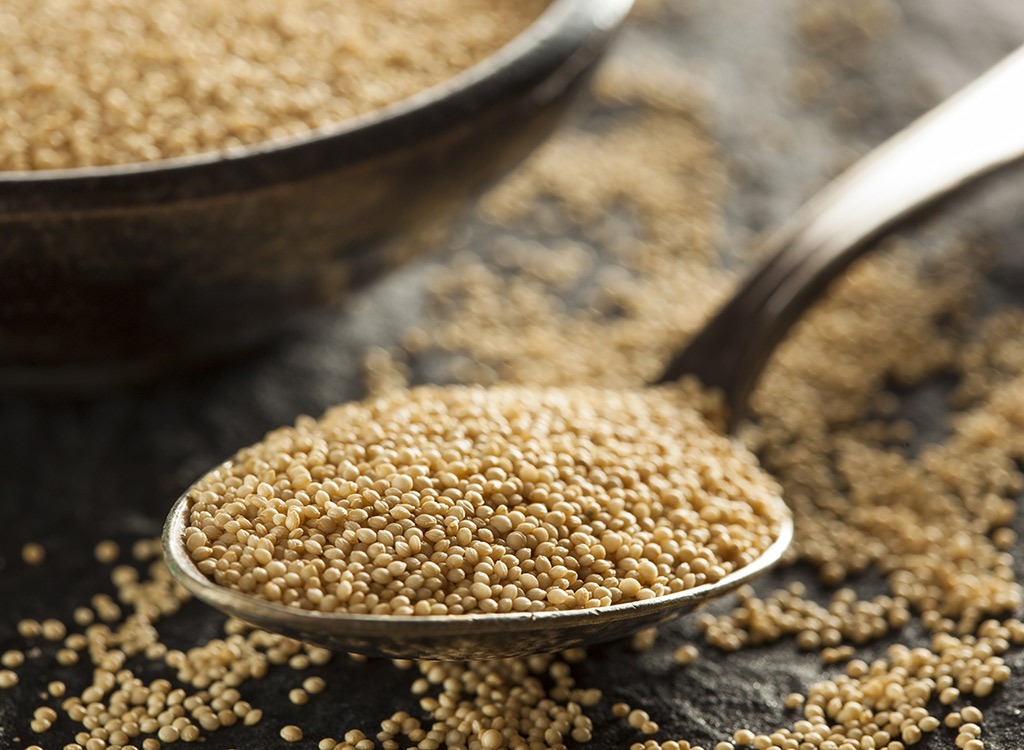
This trendy “ancient grain” is a rich source of plant-based muscle-building protein—double the amount found in rice and corn. What’s more, a review of research published in the journal Molecular Nutrition and Food Research suggests that the phytochemicals found in amaranth have strong antioxidant and anti-inflammatory properties that may lower the risk of diseases like cancer, cardiovascular disease, diabetes, and obesity.
STAY INFORMED: Sign up for our newsletter to get the latest food news delivered straight to your inbox.
Barley
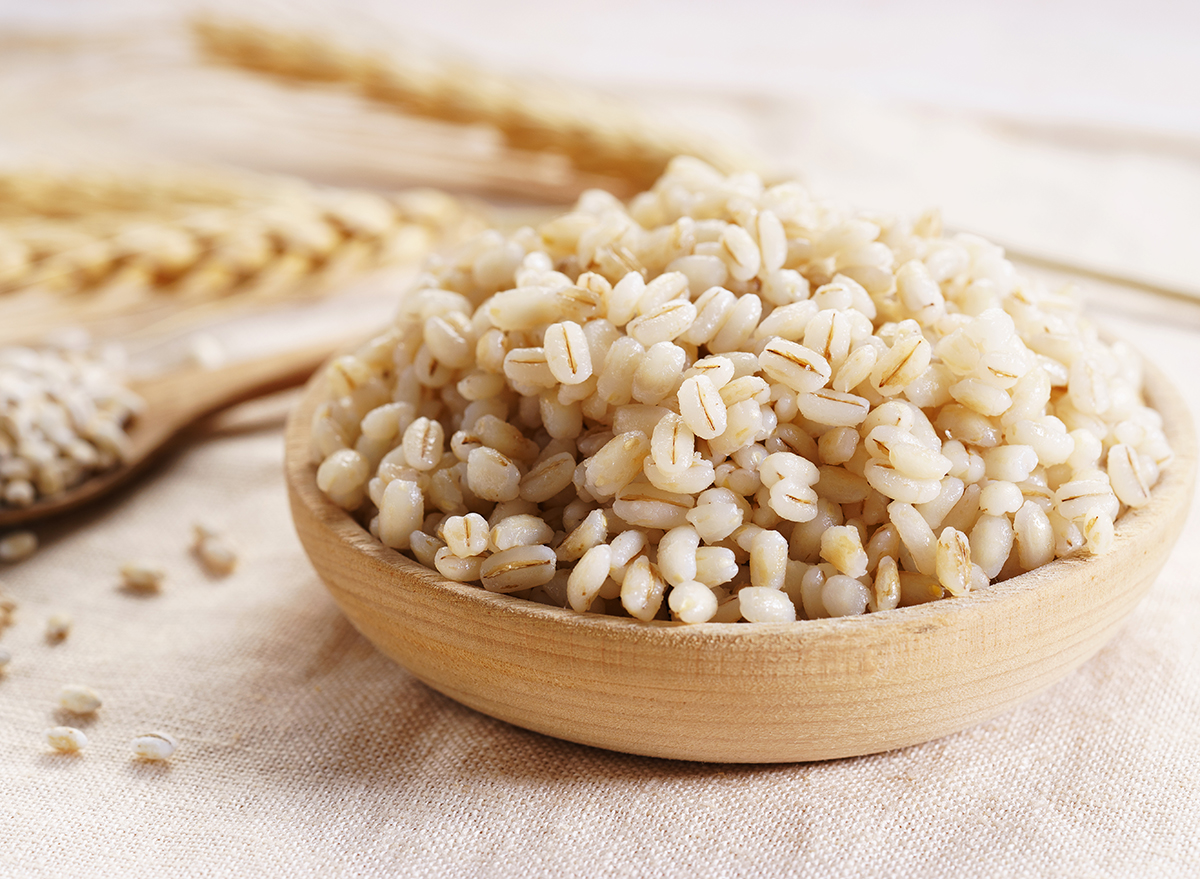
Barley does a number on high cholesterol numbers. A randomized double-blind study in Japan followed 44 men with high cholesterol for 12 weeks as the men ate either a standard white-rice diet or one with a mixture of rice and high-beta-glucan pearl barley. Barley intake significantly reduced serum cholesterol and visceral fat, both accepted markers of cardiovascular risk, the researchers found. For more foods like barley, don’t miss these foods that lower cholesterol.
Brown Rice
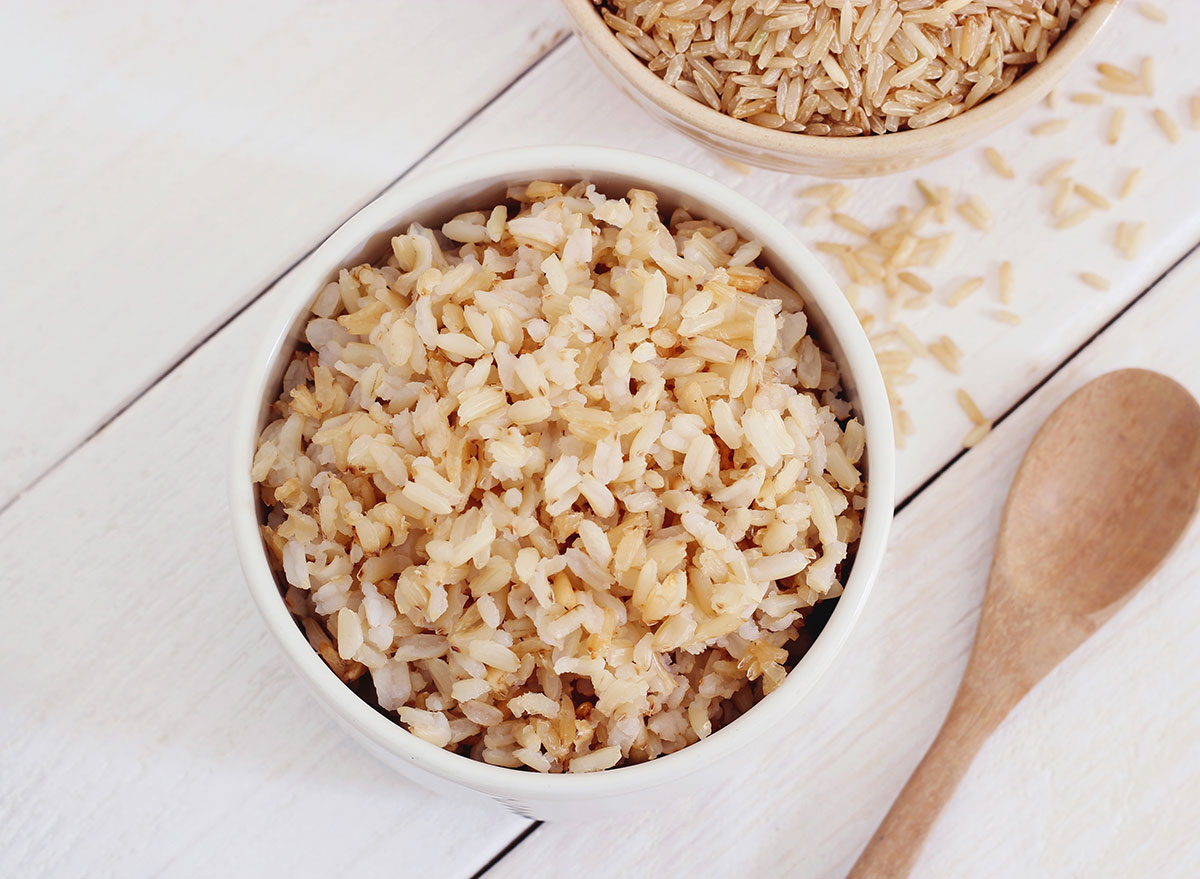
Bypass the white rice, the basmati, and jasmine rice, and pick up brown rice, which is a whole grain containing belly-satisfying protein and fiber. In one study of more than 350,000 people, those who ate the most white rice increased their risk for type 2 diabetes by 11% for each additional daily serving they ate. A half-cup of cooked brown rice has just 120 calories, 2 grams of fiber, 3 grams of protein, and 26 grams of healthy carbs.
Khorsan
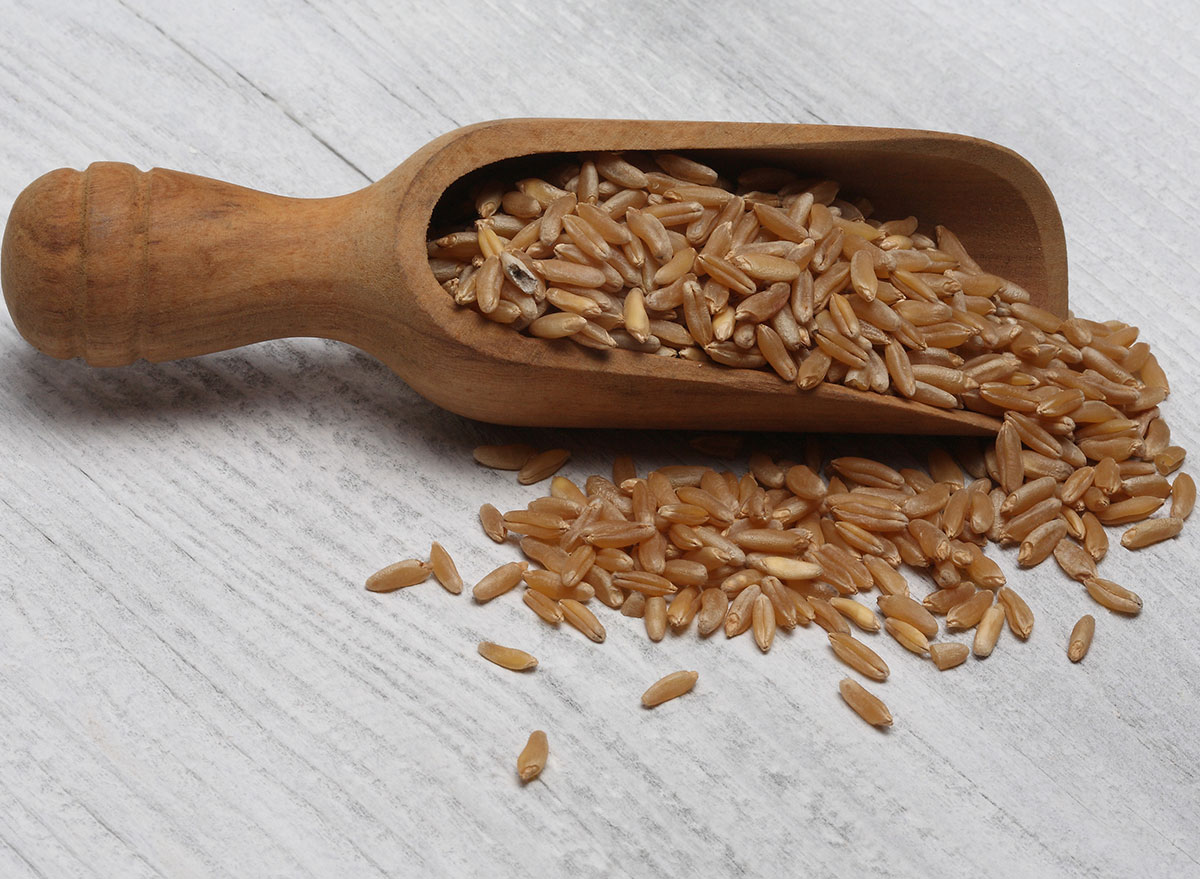
Kamut, or khorsan wheat, is another popular “ancient grain,” containing 30% more protein than regular wheat. A study in the European Journal of Clinical Nutrition suggests eating kamut can reduce cholesterol, blood sugar, and chemicals that cause inflammation throughout the body.
Oats
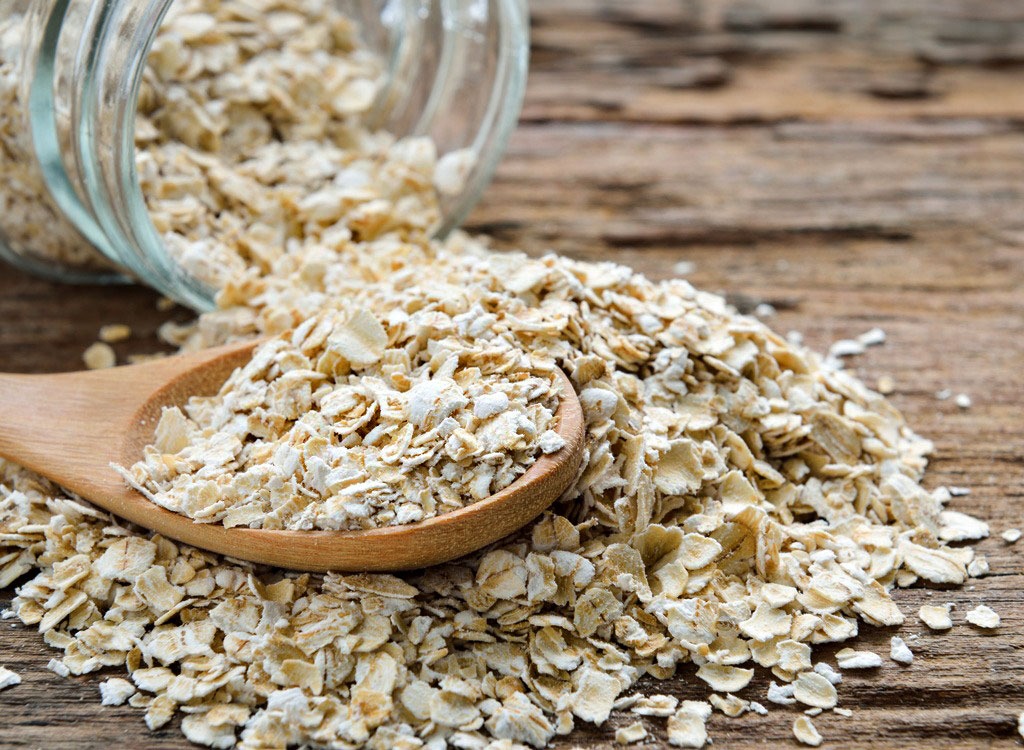
A one-cup serving of cooked oatmeal contains about 6.7 grams of dietary fiber, most of it a resistant starch. As the same suggests, a resistant starch is one that resists digestion in the small intestine and makes it way to the large intestine, where its prebiotic fibers feed healthy microbes. A study in Nutrition & Metabolism found that replacing about 5% of your daily carbs with a resistant starch like oats can boost metabolism and significantly decrease fat accumulation. Oats also contain plant chemicals called phenolic compounds and phytoestrogens that act as antioxidants, reducing the effects of chronic inflammation. Try oats in these healthy overnight oats recipes.
Quinoa

Triva note: Quinoa is actually a seed, not a grain, but it’s gluten-free for those of you with a gluten sensitivity. And its packed with nutrition: 2.9 grams of fiber, 6 grams of protein, B vitamins, blood-pressure reducing potassium, and 32 grams of healthy carbs in a 1 cup cooked portion.
Whole Wheat Bread (and whole wheat pasta)
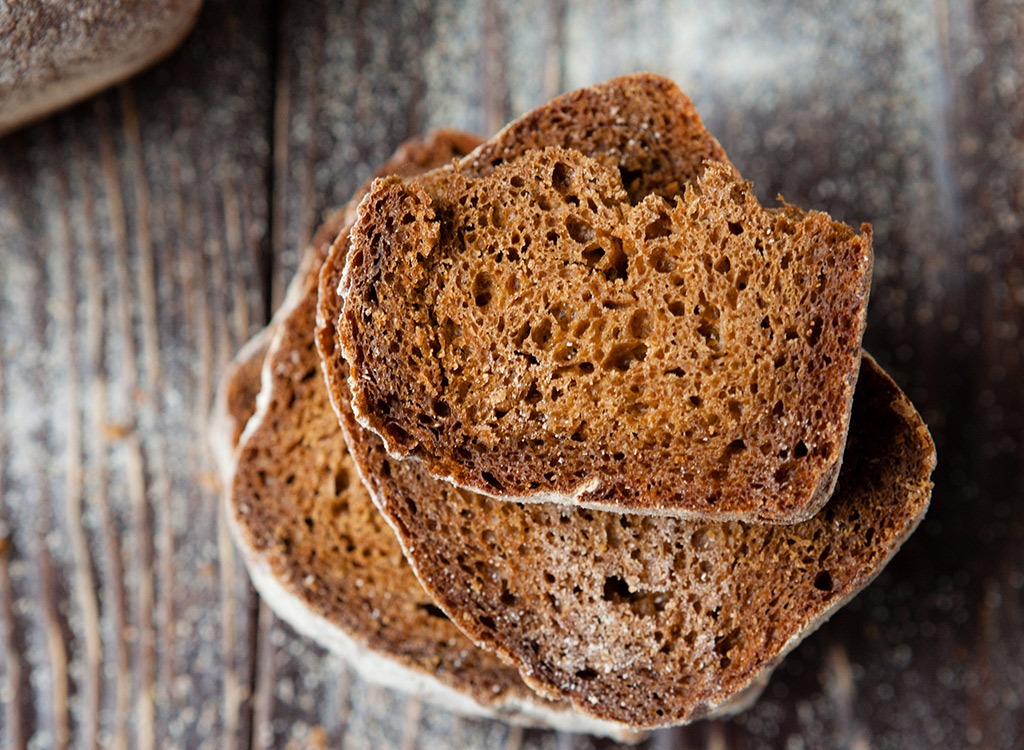
Whole wheat bread is different from wheat bread—that’s why its one of the best breads for weight loss. Look for the words “100% whole wheat” or “100% Whole Grain” on your bread package. That ensures that you’re buying a bread made with the most nutritious flour. Whole wheat contains all of the grain’s brand, germ, and endosperm, the good stuff that’s removed when refined into wheat bread or white bread. Only whole wheat bread will give you the cholesterol-reducing, blood-sugar stabilizing, hunger-satisfying benefits of whole grains. To make it even easier to find, the Whole Grains Council has developed a “100% Stamp” for manufacturers to use to identify breads in which all their grain ingredients are whole grain. Look for it on the packaging of breads, pasta, and other whole-grain boxed and bagged foods.
Black Beans
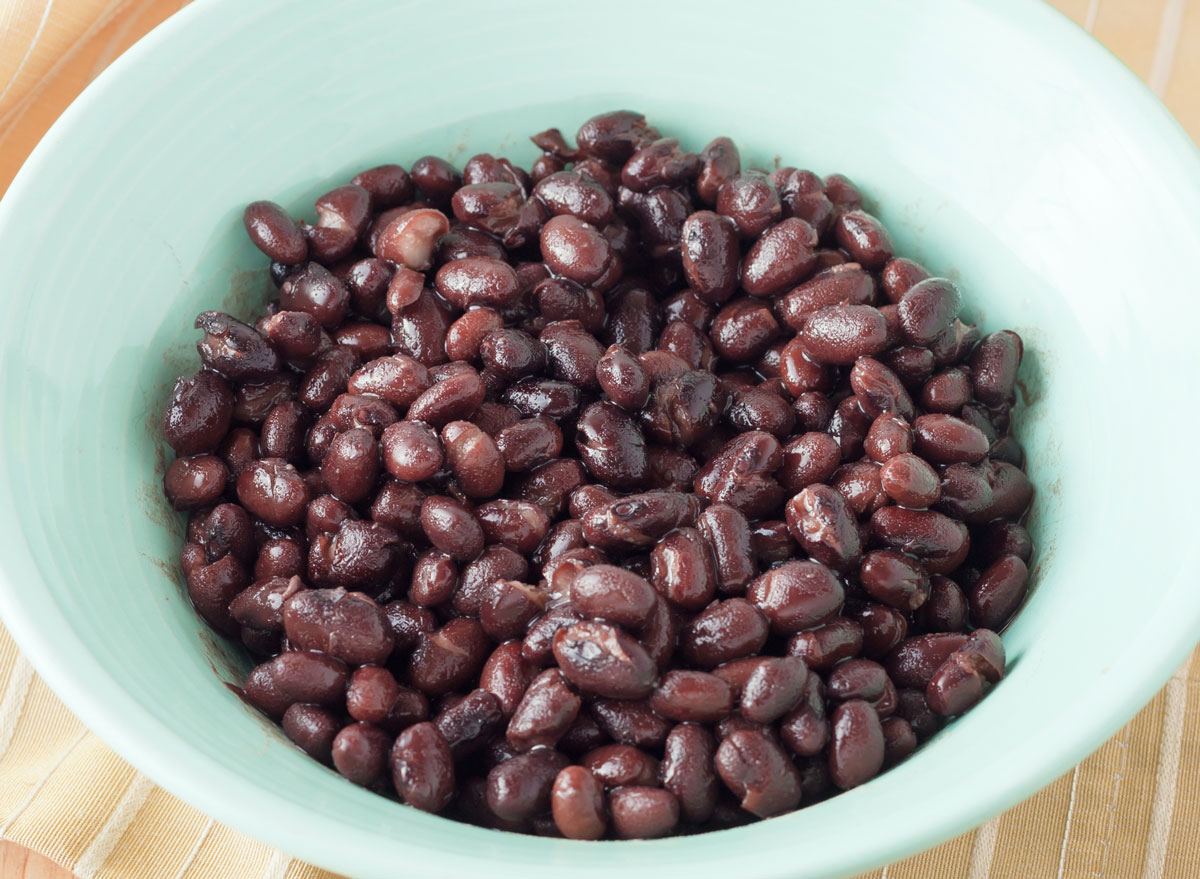
Studies suggest that increasing consumption of high-fiber foods like black beans decreases the risk of metabolic diseases like obesity, diabetes, and heart disease. Eating black beans promotes healthy bacteria in the gut and helps prevent constipation. A good source of vitamin B6 and folate, beans have been shown to prevent the buildup of the inflammatory compound homocysteine that can damage blood vessels and lead to cardiovascular problems. Black beans also contain quercetin, a natural anti-inflammatory that research suggest may reduce the damage caused by LDL (bad) cholesterol, according to a report in Today’s Dietitian.
Chickpeas
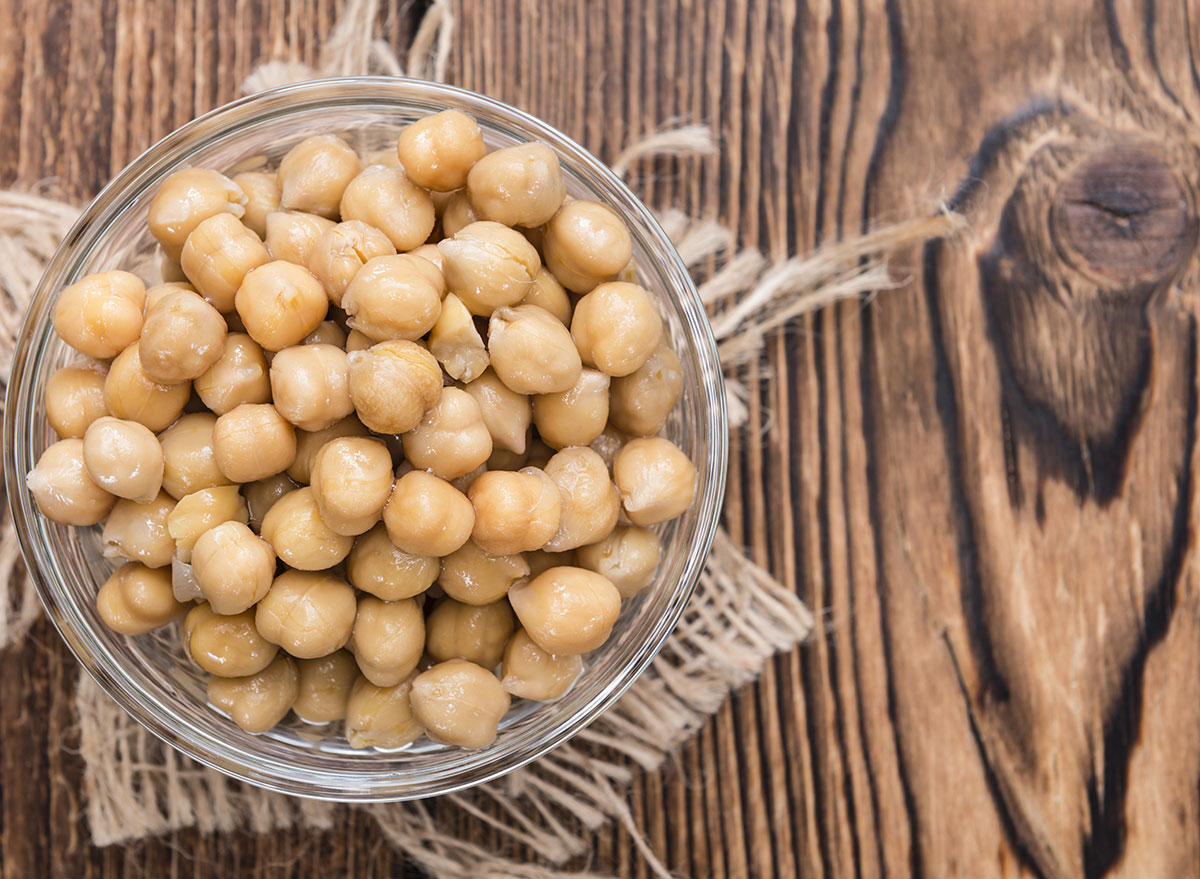
Toss them on a salad. Mash them into hummus. Use them in a vegetarian main dish. Chickpeas are a versatile legume boasting a host of health benefits. Both dried and canned chickpeas have a low glycemic index and low glycemic load, and contain amylose, a resistant starch that digests slowly, helping to prevent blood sugar surges. That makes chickpeas an ideal staple for people with type 2 diabetes or those trying to avoid the disease, according to the T.H. Chan School of Public Health at Harvard. Like other legumes, chickpeas can be part of a successful diet plan for weight-loss.
In one four-week Free Radical Research study, researchers found that participants who ate a calorie-restricted diet that included four weekly servings of legumes lost more weight than people eating a diet similar in calories but without legumes.
Kidney Beans
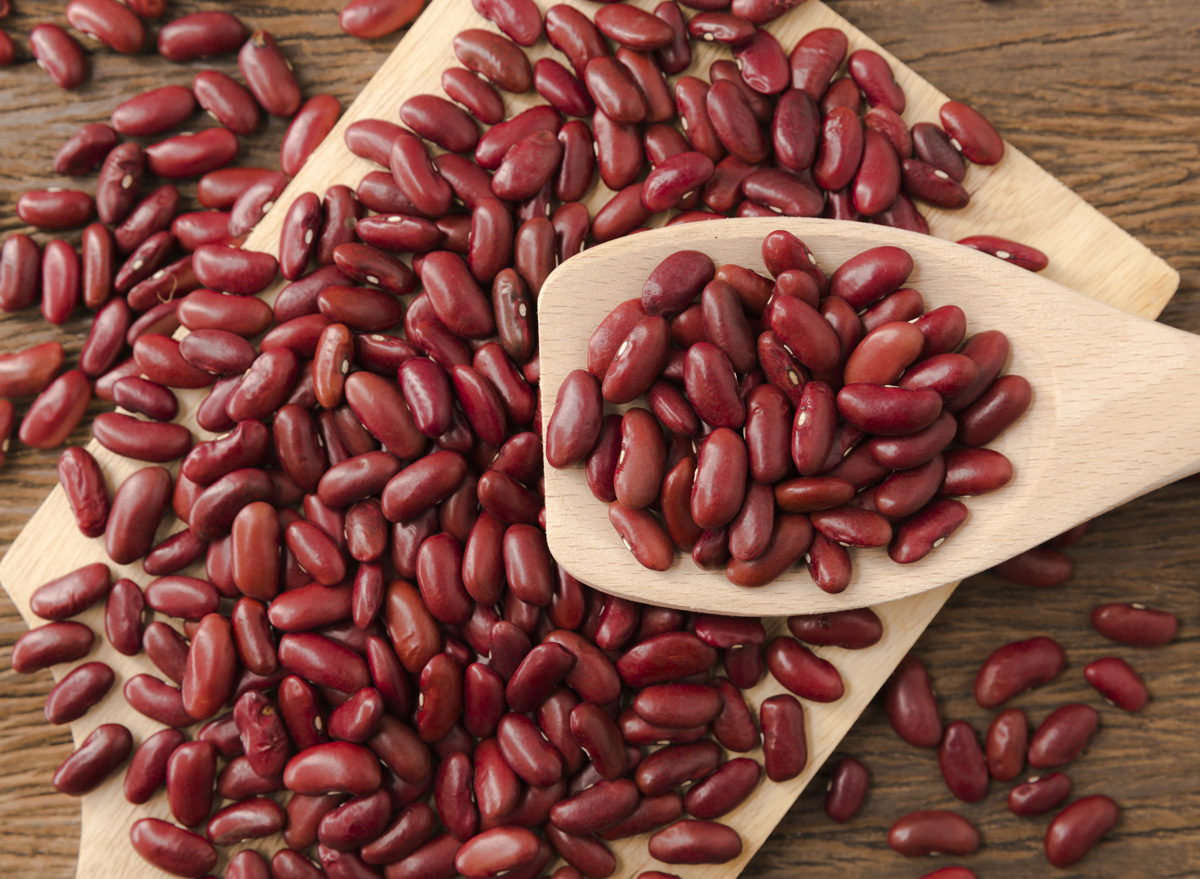
Very low in carbs, kidney beans are an excellent source of fiber (8 grams per 100 grams, cooked) and protein, helping to boost feelings of fullness and manage blood sugar levels. Take a night or two off of the meat chuckwagon and get your protein by adding beans to a soup or casserole or using them to fill out a taco.
Lentils
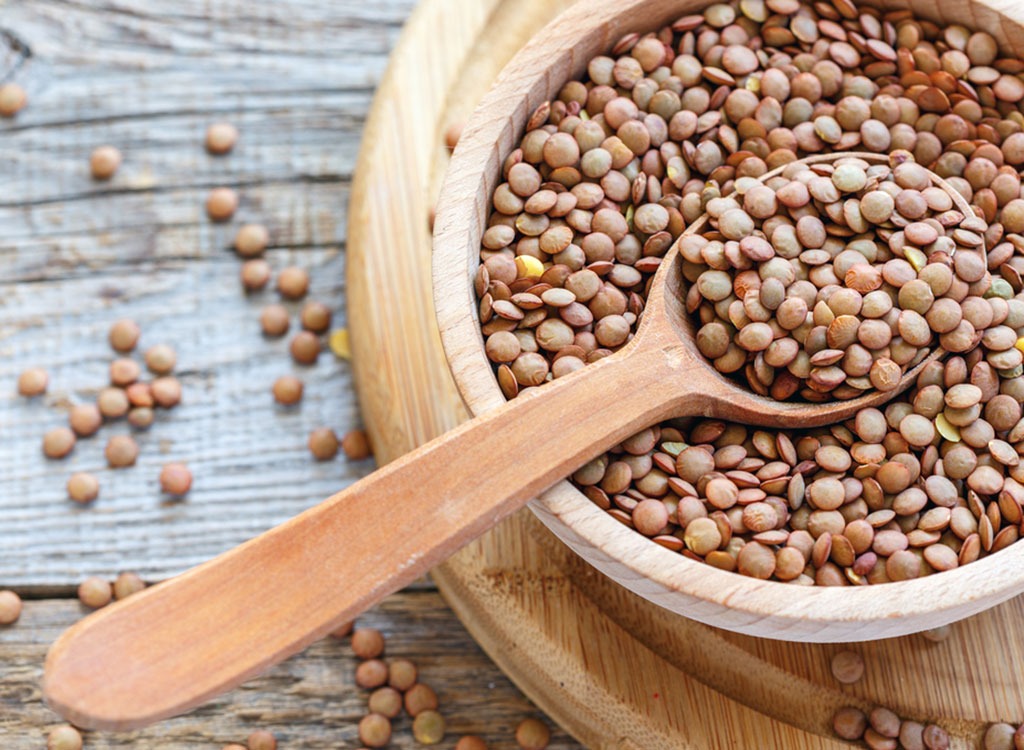
Per serving, lentils are one of the top plant-based proteins, coming in just behind tofu and tempeh but ahead of nuts, seeds, and quinoa. Lentils will also fill you up with a healthy dose of dietary fiber, about 8 grams per serving. Need some recipe ideas to get more lentils and beans into your family’s diet? Check out these 25 delicious meals featuring pulses like lentils.
Apples
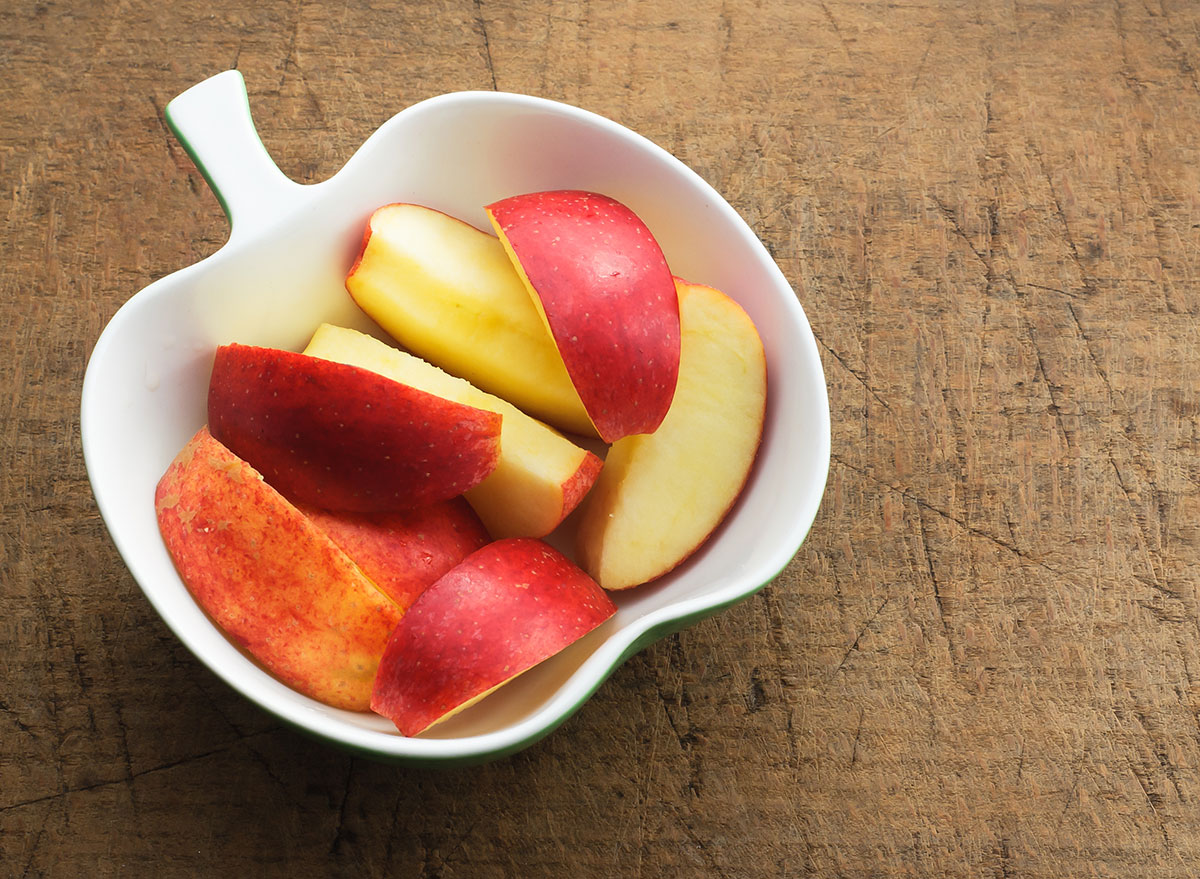
Skip the apple juice (no fiber) and eat the whole fruit. Eating the skin and pulp of a medium apple delivers 4 grams of fiber. A study in BMJ linked eating whole fruits, particularly apples, to a lower risk of type 2 diabetes. What’s more, scientists have recently calculated the antioxidant power of apples to be equal to more than 1,500 milligrams of vitamin C.
Avocado
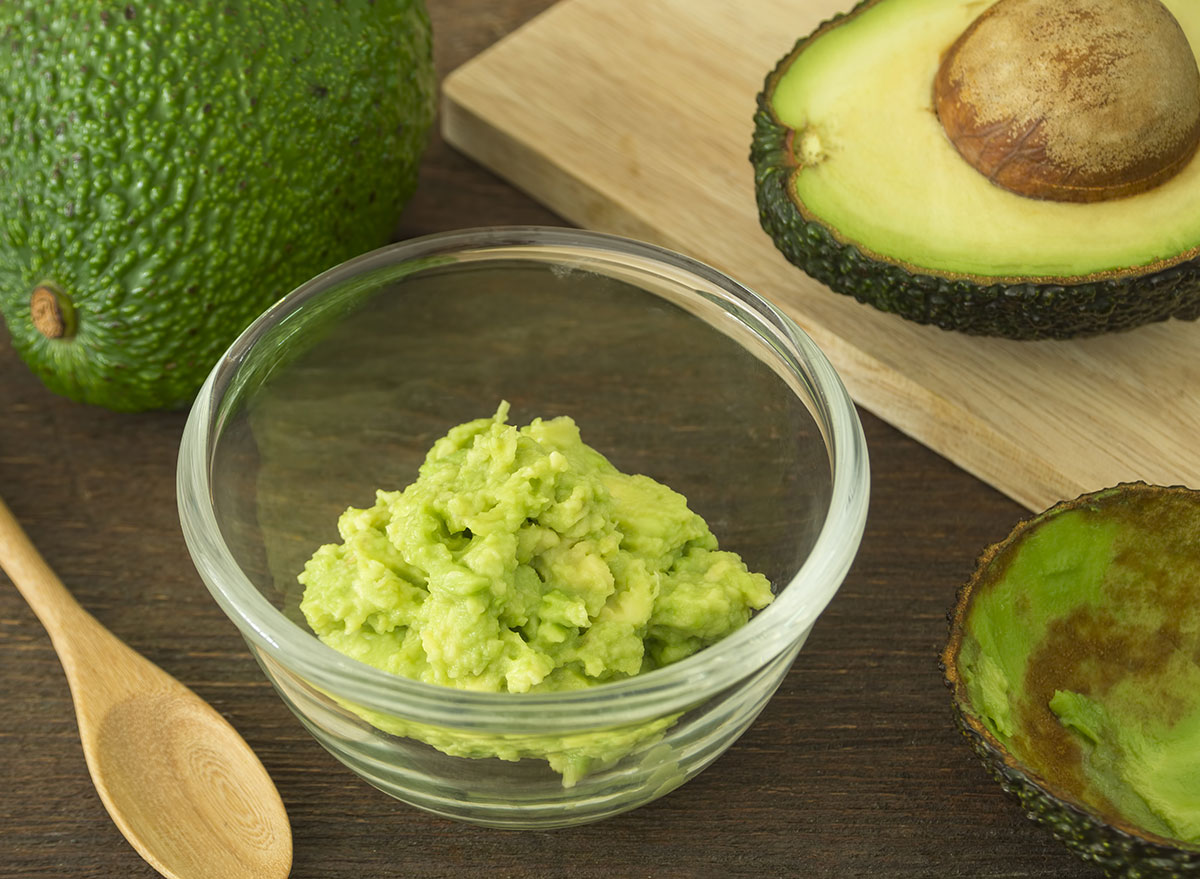
Unlike most fruits, avocado is low in carbohydrates and full of heart-healthy fats. That makes it an excellent carbohydrate for weight loss and good health. The monounsaturated fat (specifically oleic acid) in avocado is satiating so it’s great in combination with eggs and whole wheat toast for breakfast. Avocados have also been linked to reduced inflammation. High in potassium, they also may reduce blood pressure.
Berries

Blue, black, rasp and straw, no matter how you spell it all these berries boast a powerful nutrition profile, full of antioxidant vitamins, and fiber. But if you were to choose only one, go for blueberries, which have the highest antioxidant content of them all.
Cherries
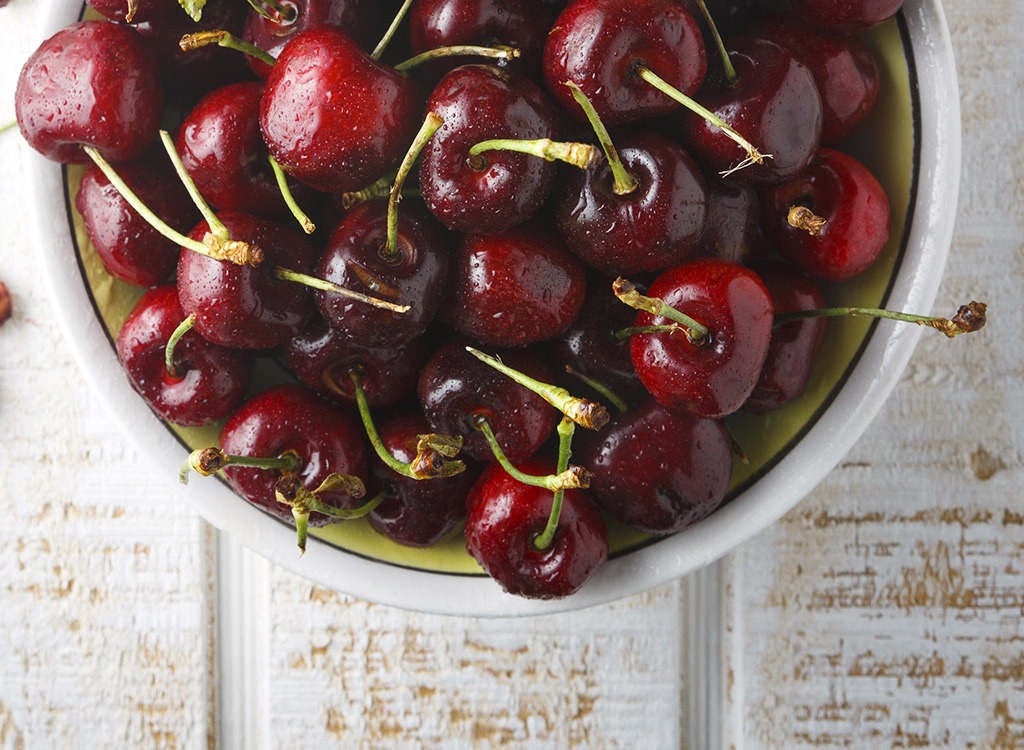
You don’t have to wait until summertime, frozen cherries are available all year and retain all of their phytonutrient richness. Known for their ability to help you fall asleep faster, tart cherries also may pay a role in decreasing visceral fat. An animal study at the University of Michigan found that rats fed tart cherries lowered their belly fat mast by 9% when compared to rats fed a regular diet.
Grapefruit
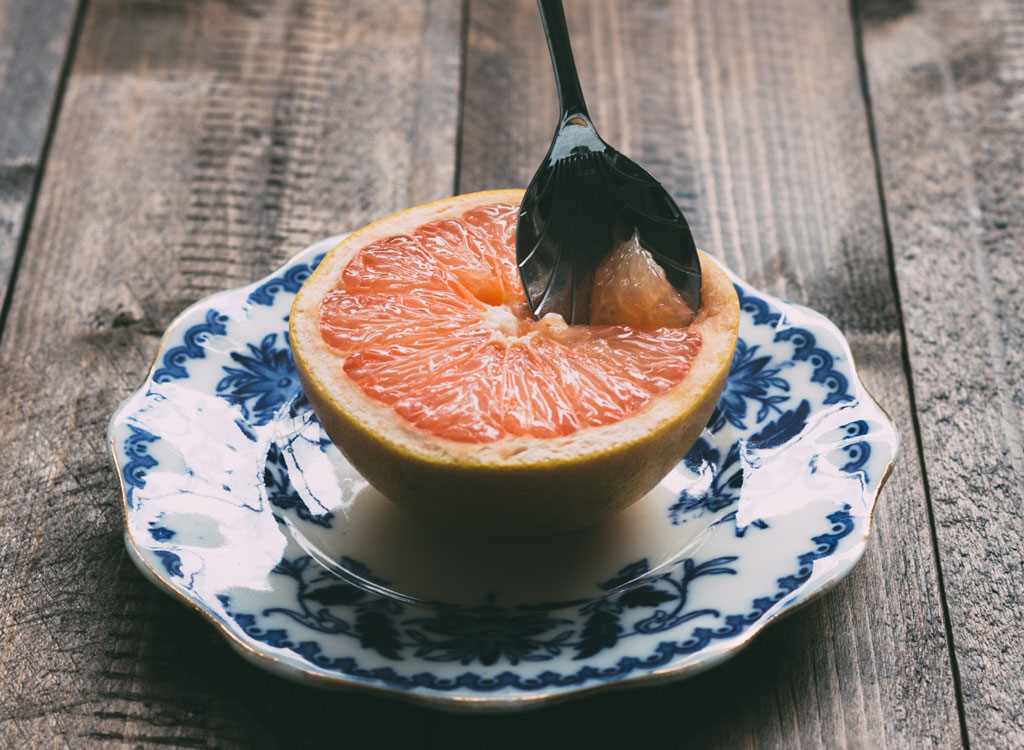
Studies suggest eating one grapefruit a day may reduce arterial narrowing by 46% and lower LDL cholesterol and blood pressure. And there appears to be truth to the Grapefruit Diet for weight loss, too. In a study at the Nutrition and Metabolic Research Center at Scripps Clinic, participants who ate half a grapefruit with each meal lost 3.6 pounds, while those who drank a serving of grapefruit juice three times a day lost 3.3 pounds.
Kiwi
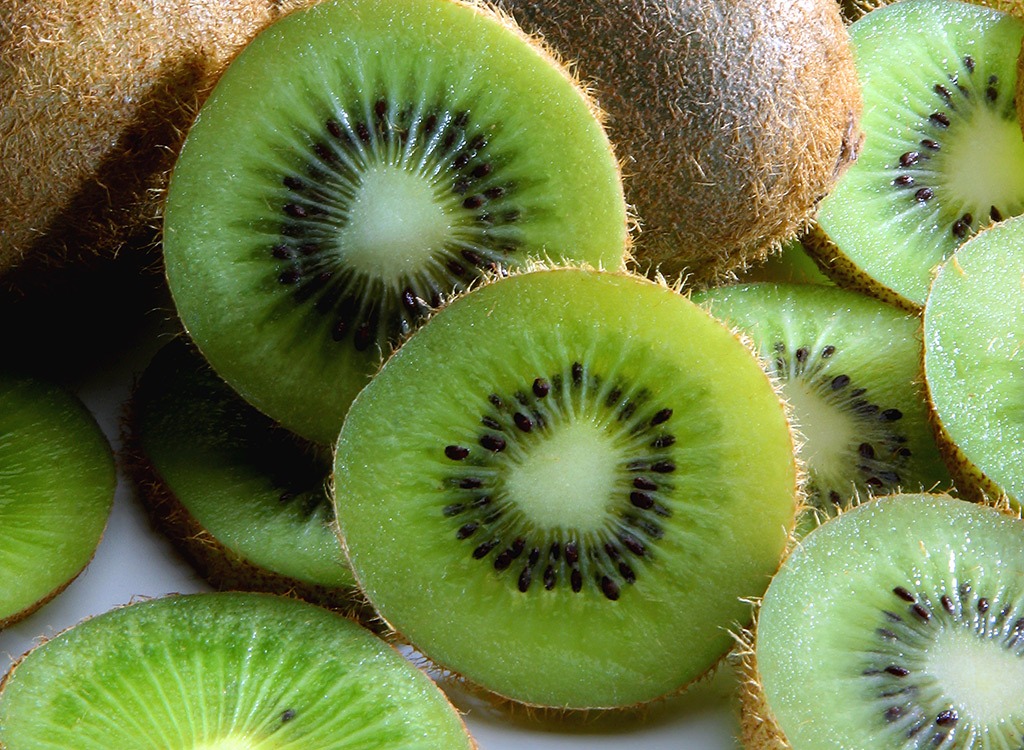
Eat ’em as you would an apple, edible skin and all. You’ll boost your intake of fiber from the fruit by 50%. That’ll keep you feeling fuller, reduce LDL cholesterol, and supply you with folate, and vitamin E, important immune system-boosting nutrients. Kiwi also happens to be one of the 5 Absolute Best Foods to Eat For Better Sleep.
Red & Purple Grapes
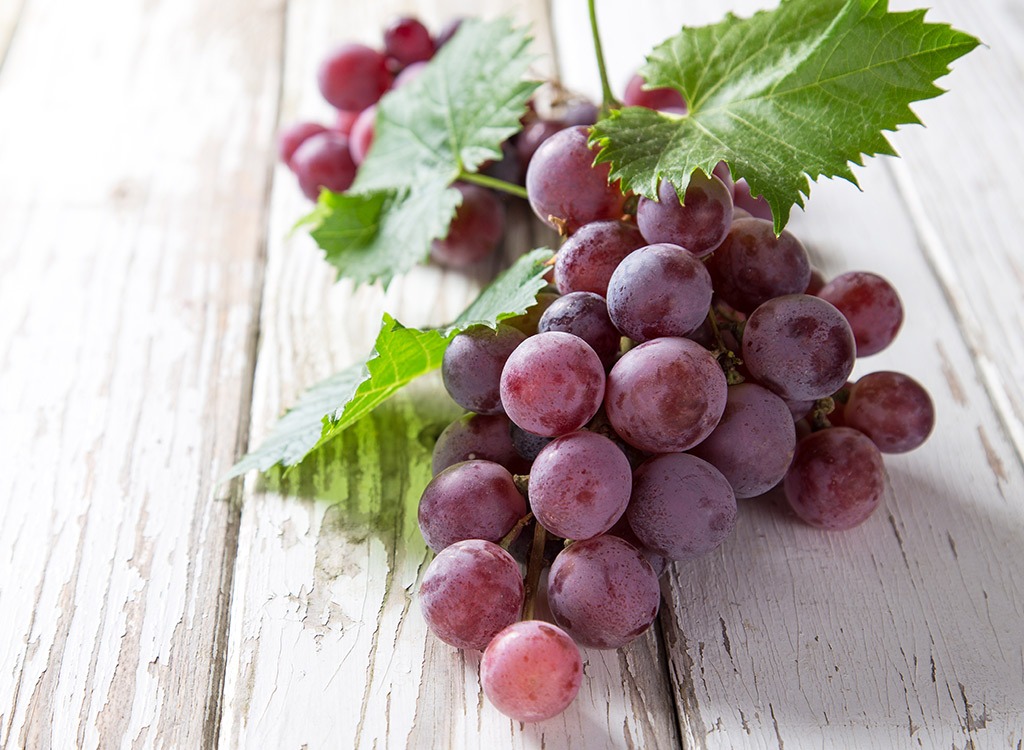
A study in The Journal of Nutrition found that compounds in purple grapes help slow the formation of artery-clogging LDL cholesterol. Also, the anthocyanins and resveratrol in grapes have been shown to reduce inflammation.
Watermelon
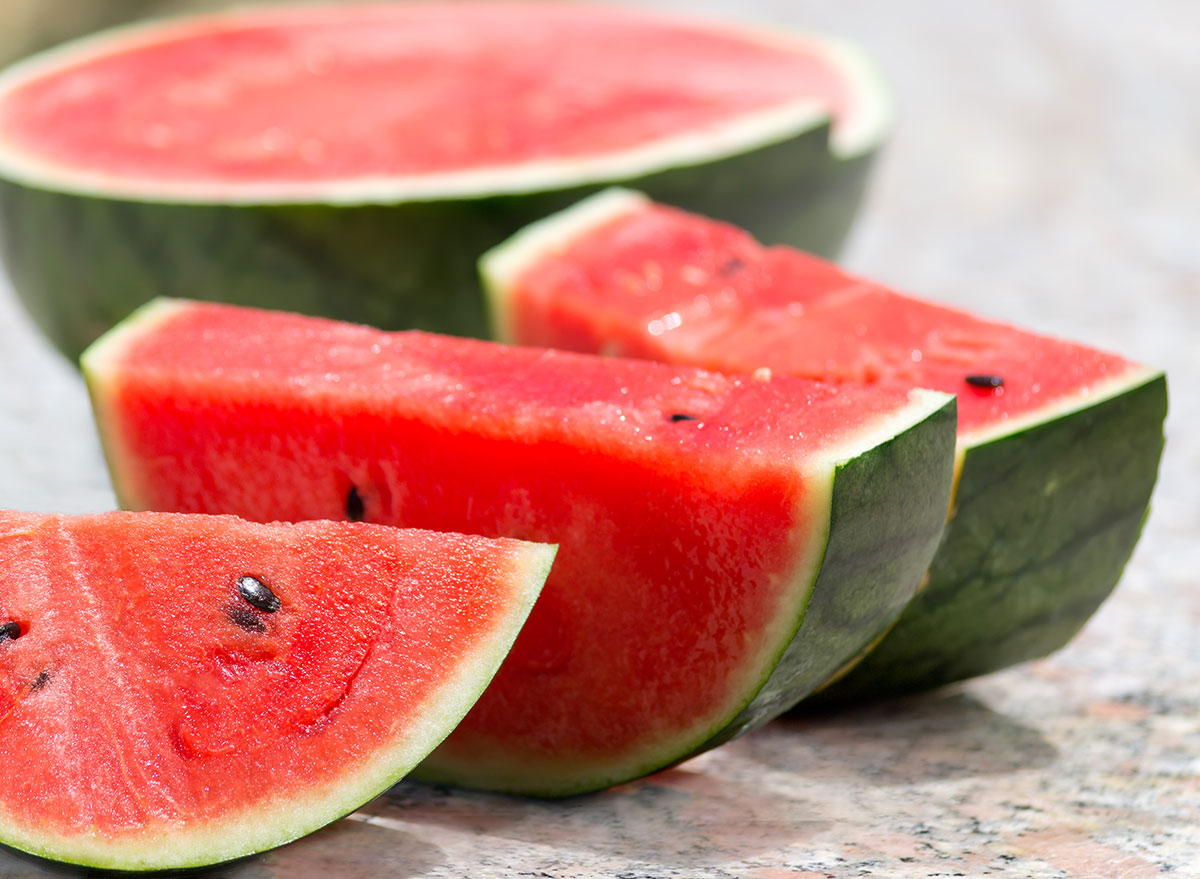
Sure, watermelon is sweet tasting, but it’s so much more nutritious of a dessert or snack than any baked good or packaged confection. It’ll help you cut down on consumption of sugar if you use it as a substitute for those unhealthy options. Plus, watermelon is a good source of vitamins A, B-1, and B-6, calcium magnesium, potassium, iron, and lycopene.
Acorn Squash
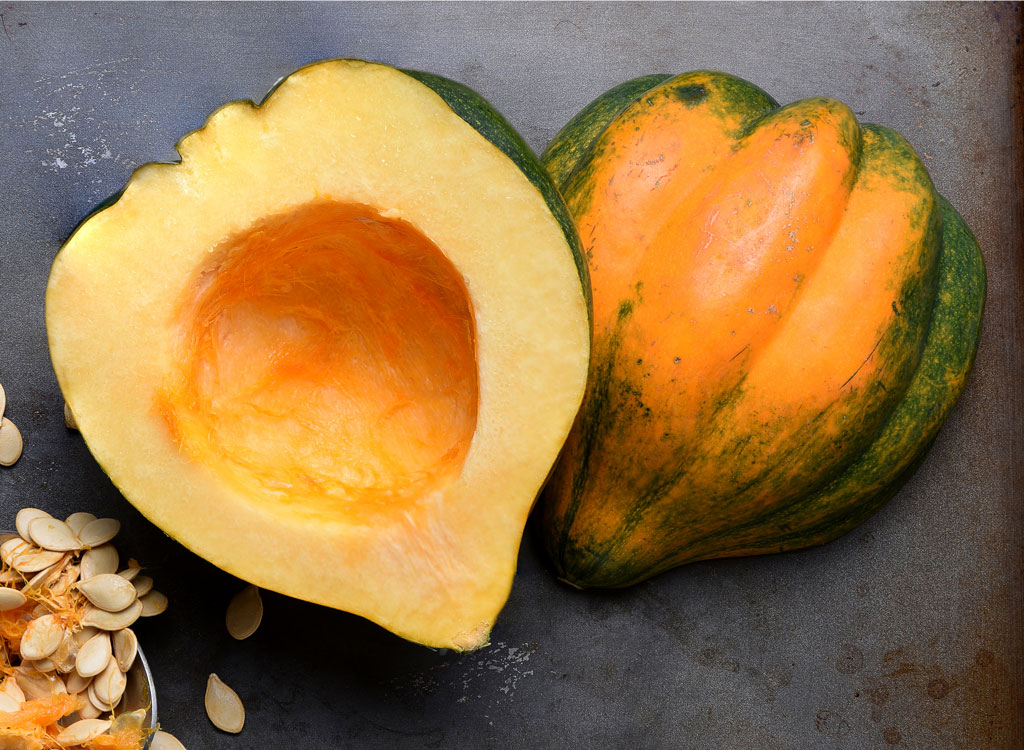
This naturally sweet veggie delivers about a third of your day’s requirement of fiber in a one-cup serving, plus 30% of your vitamin C needs and carotenoid antioxidants that protect against eye, heart, and metabolic conditions.
Beets
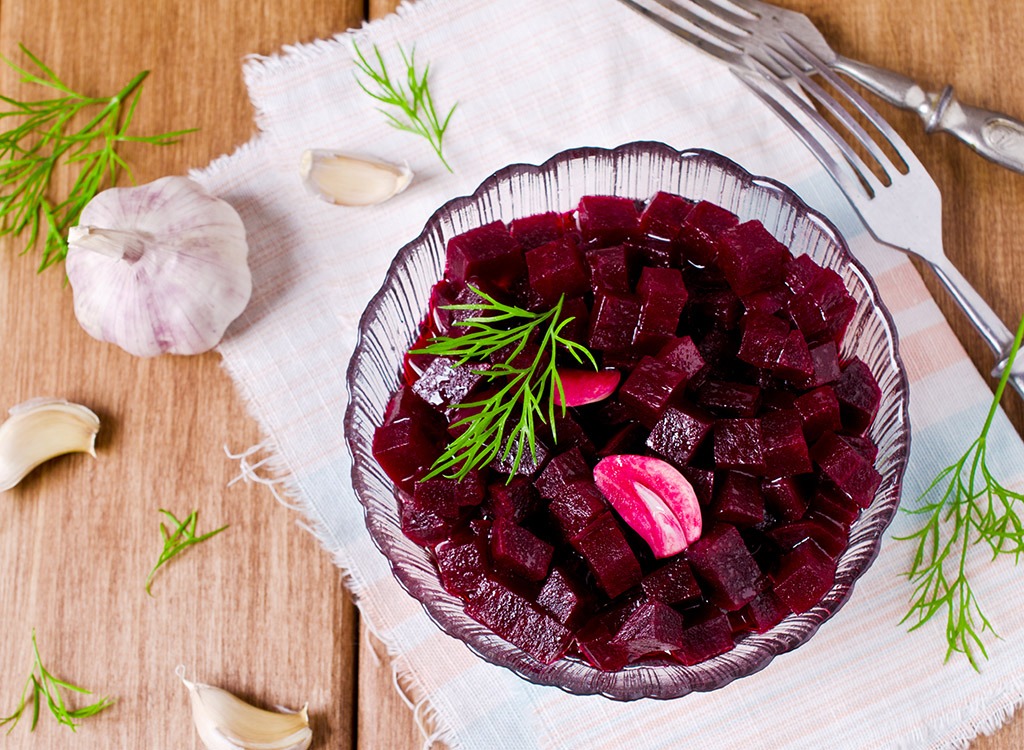
Root vegetables like beets and carrots are sometimes left off of low-carb diet plans. Don’t make that mistake. You’d be missing out on a lot of great nutrients like folate, potassium, iron, vitamin C and fiber. And studies suggest that beets benefit people with diabetes and heart issues. In one study in Nutrition Journal researchers reported that subjects who drank beetroot juice saw their systolic blood pressure significantly lower six hours after drinking 500 grams of the juice. Beets and beetroot juice have also been associated with improved blood flow and exercise performance. So more beets, less of the 15 Exercise Mistakes That Are Ruining Your Workout.
Bell Peppers
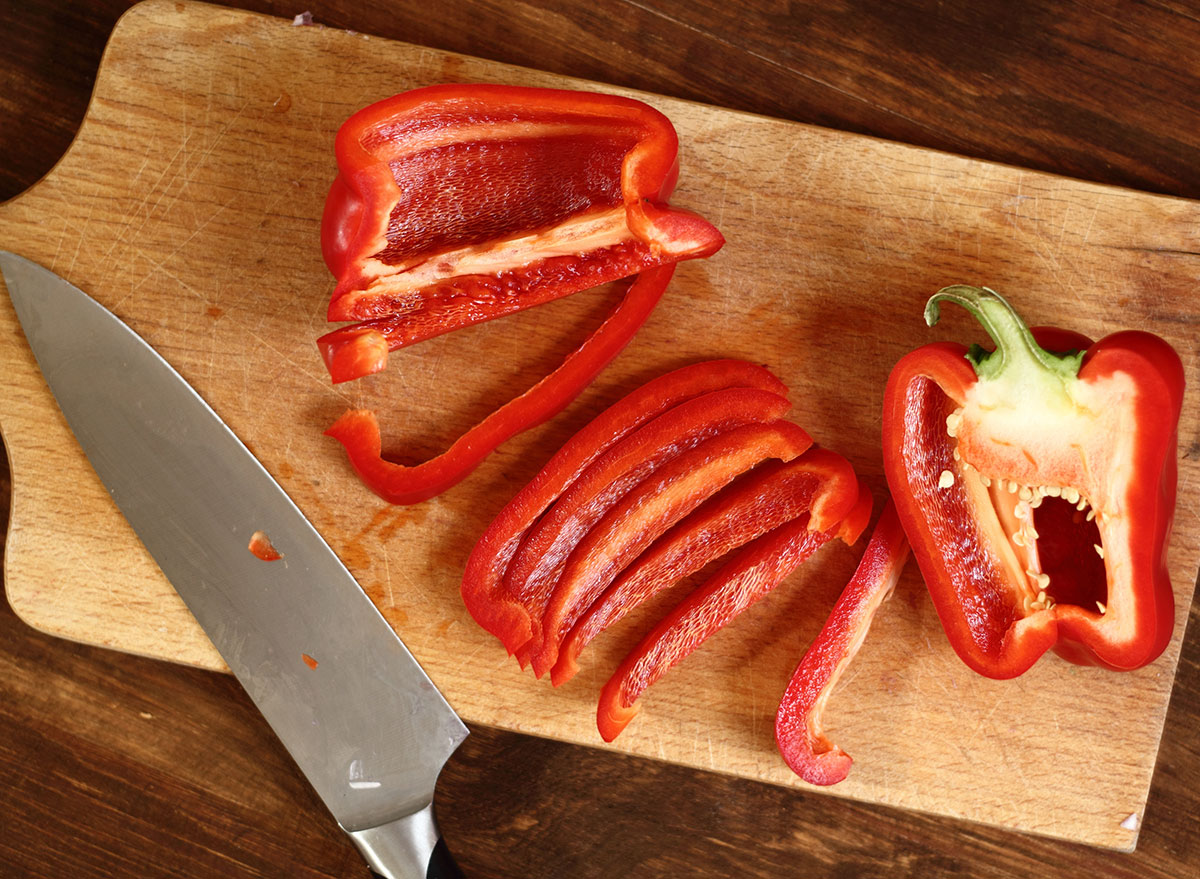
Red bell peppers are one of the most underrated sources of vitamin C, packing 153 milligrams per serving, according to Samantha Franceschini, MCSN, a nutritionist and health coach at Parsley Health. Bell peppers are also a great source of vitamin A, vitamin B6, folate, fiber, vitamin K, niacin, and thiamine.
Broccoli
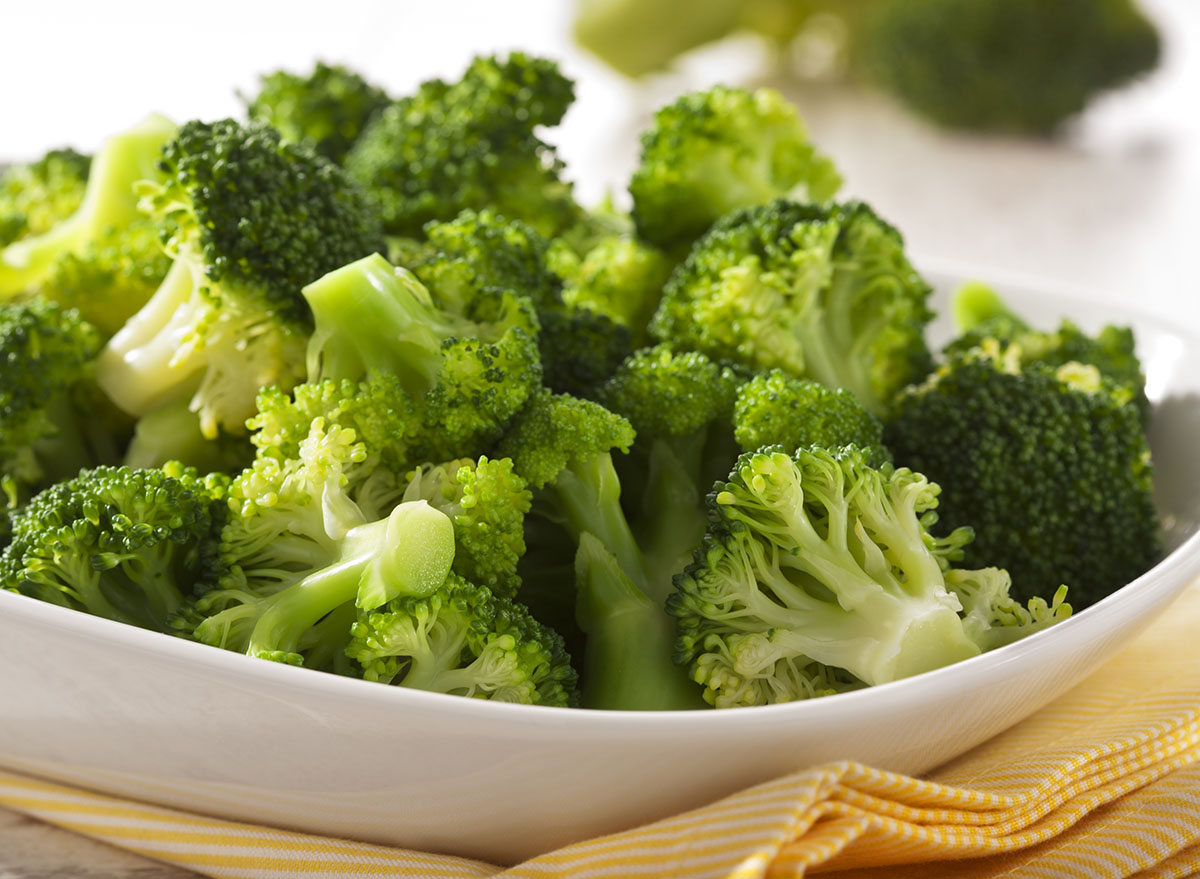
Because of its high water content (89%) and 2 grams of fiber, broccoli will fill you up without weighing you down. One cup of raw broccoli contains just 31 calories and 3 grams of carbohydrate. But it’s a powerhouse of nutrients, including protein, folate, magnesium, iron and vitamin K1, which strengthens bones.
Brussels Sprouts
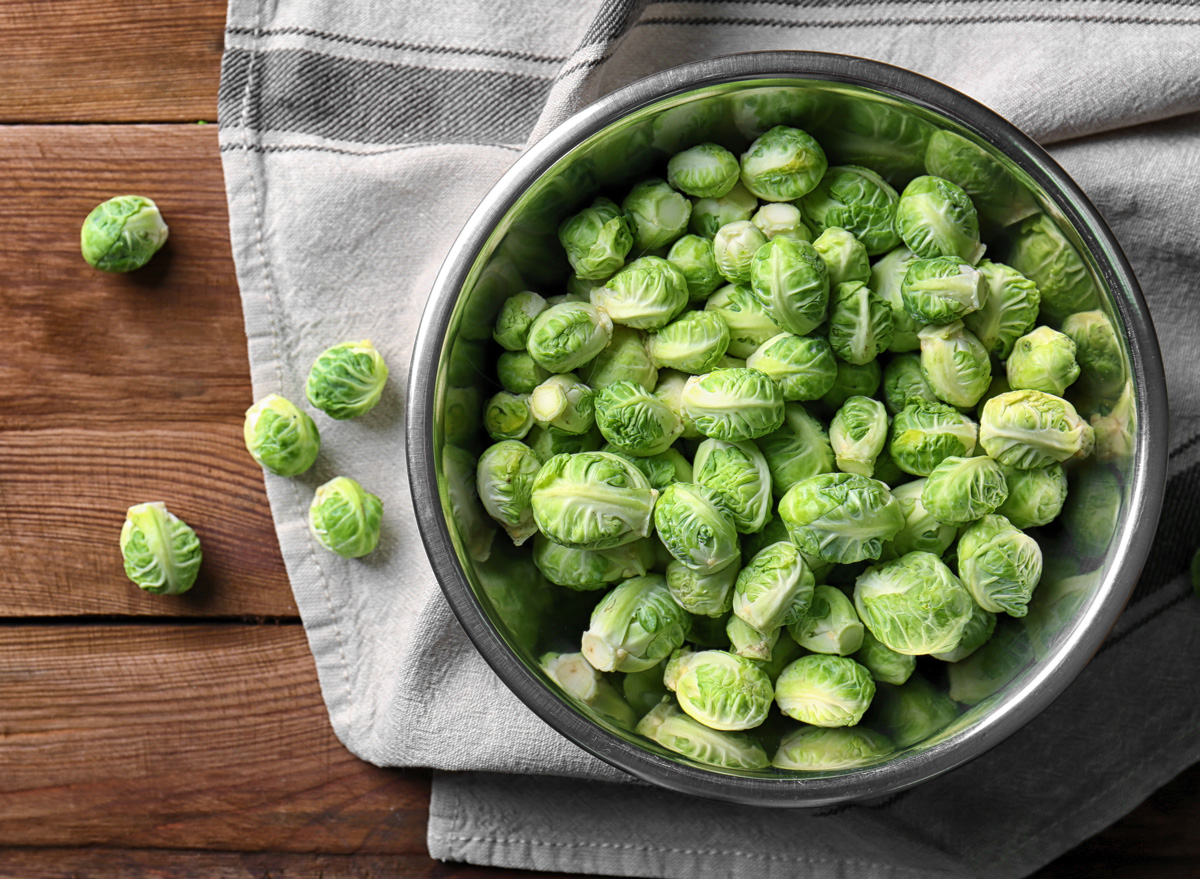
Like cabbage, kale, and cauliflower, Brussels sprouts are a cruciferous vegetable that contains an important phytochemical called glucosinolate. While there’s no scientific evidence that Brussels sprouts offer anti-cancer protection in humans, these glucosinolate compounds have been researched for their ability to protect cells from DNA damage, according to The Nutrition Source at the T.H. Chan School of Public Health at Harvard.
Cauliflower

This nutrient-rich cruciferous vegetable (which can also be made into a delicious “rice”) contains high amounts of vitamins C and B and about three grams of fiber in one cup.
Kale
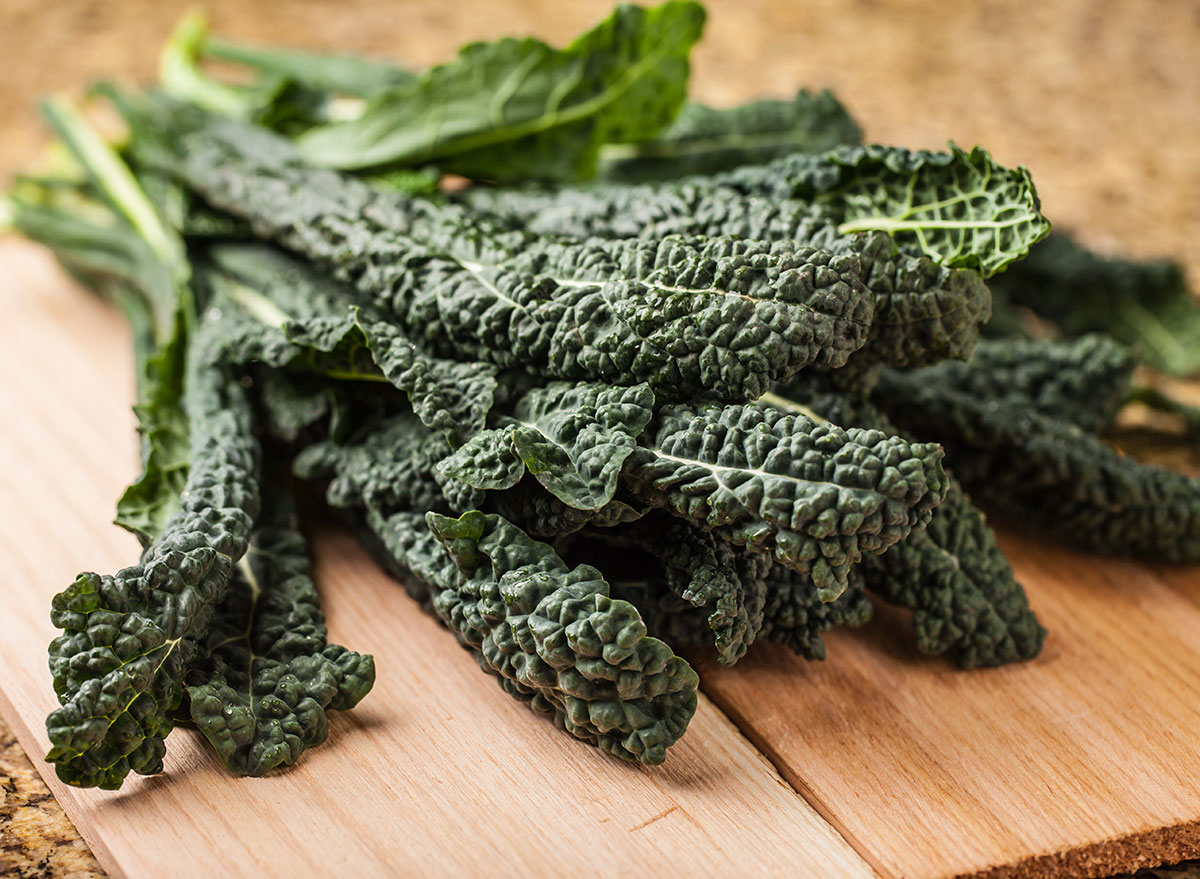
The Mayo Clinic calls kale a “diabetes-friendly, weight-friendly vegetable” and a “nutritional superstar” due to its robust amounts of vitamins A, K, B6, C, calcium, potassium, and manganese. A one-cup serving contains just 33 calories and 7 grams of carbohydrate, so, go ahead, have seconds, even thirds.
Red Cabbage
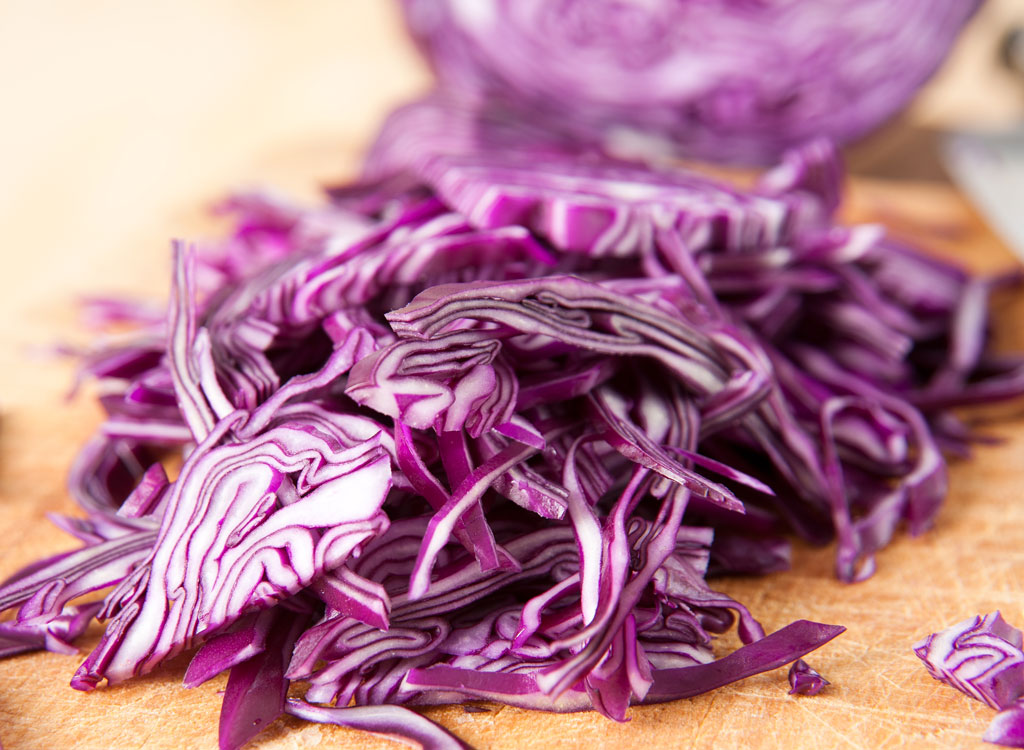
Like kale and broccoli, cabbage is a cruciferous vegetable with strong anti-inflammatory properties. The red variety contains anthocyanins, the same dark red and purple flavonoid pigments you find in dark-colored berries like blueberries.
Sweet Potatoes
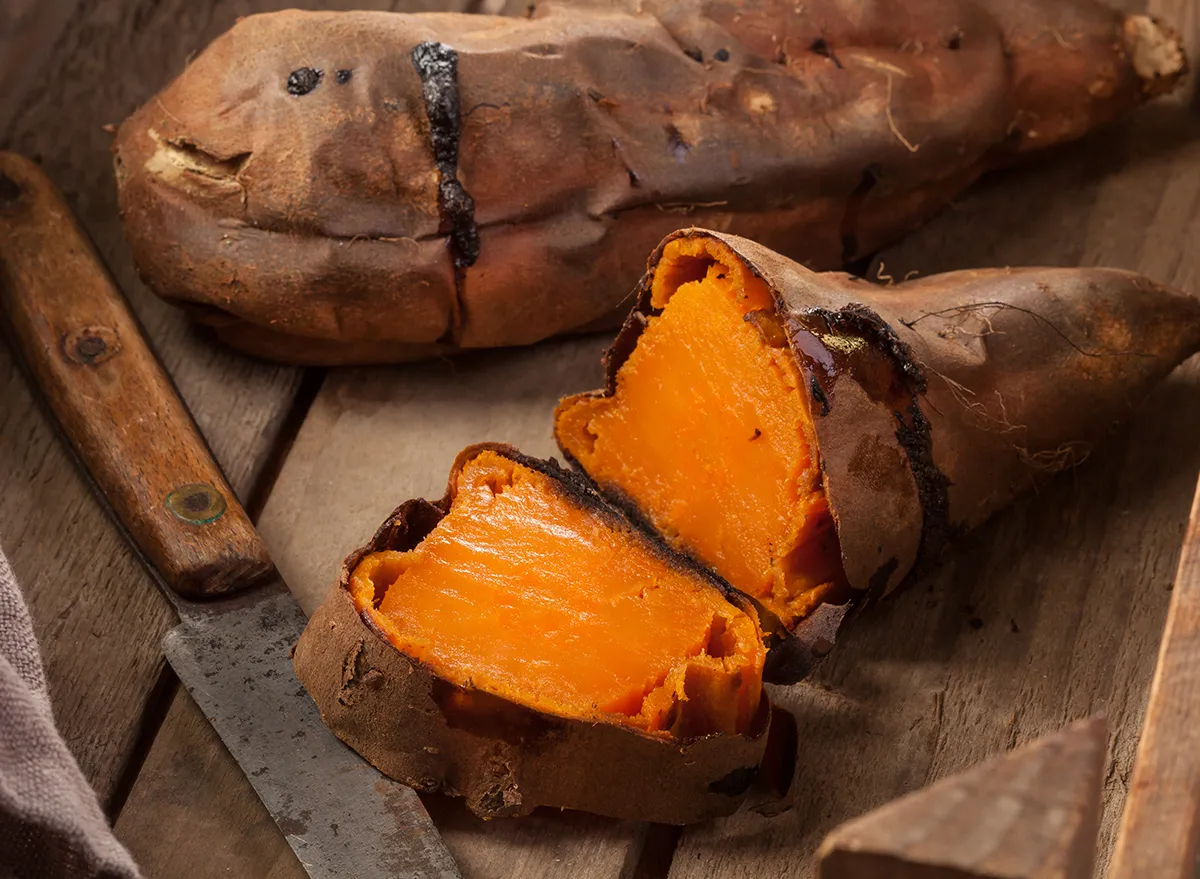
Don’t discount these orange spuds because of their sweet name. Sweet potatoes are loaded with fiber, so they digest slowly, keeping your blood sugar stable and your body feeling full longer. Plus, they are rich in antioxidants called carotenoids, which also positively impact blood sugar levels and reduce the risk of insulin resistance. They’re also on our list of 19 Foods To Eat Every Day to Keep You Looking Young.
